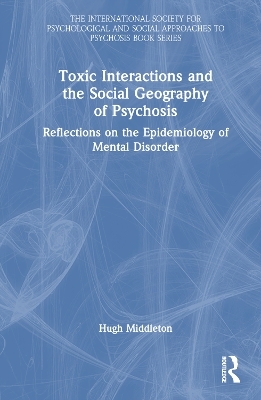
Toxic Interactions and the Social Geography of Psychosis
Reflections on the Epidemiology of Mental Disorder
Seiten
2023
Routledge (Verlag)
978-0-367-18012-6 (ISBN)
Routledge (Verlag)
978-0-367-18012-6 (ISBN)
Toxic Interactions is a review of quantitative research revealing how urban living, trauma, ethnicity, stress and familial influence the risk of troubling psychotic experiences.
Each of these is reviewed in search of their social implications, and a constructivist approach identifies their common threads. The contributions of newer psychotherapeutic approaches such as Open Dialogue and Recovery programmes are considered, and a consistent interpretation emerges; that is not the observable features of disturbed mental state that deserve key attention, but how these are generally understood by others, and in particular the 'client's' close associates.
Toxic Interactions and the Social Geography of Psychosis will be welcomed by all who find conventional approaches to mental health difficulties unsatisfactory, whether that is as a practitioner frustrated by the counter-productive expectations of their institutional setting, an academic exploring different perspectives a 'service user' disappointed by not experiencing the care they feel is needed, or as third party perplexed by the contradictions of contemporary psychiatry.
Each of these is reviewed in search of their social implications, and a constructivist approach identifies their common threads. The contributions of newer psychotherapeutic approaches such as Open Dialogue and Recovery programmes are considered, and a consistent interpretation emerges; that is not the observable features of disturbed mental state that deserve key attention, but how these are generally understood by others, and in particular the 'client's' close associates.
Toxic Interactions and the Social Geography of Psychosis will be welcomed by all who find conventional approaches to mental health difficulties unsatisfactory, whether that is as a practitioner frustrated by the counter-productive expectations of their institutional setting, an academic exploring different perspectives a 'service user' disappointed by not experiencing the care they feel is needed, or as third party perplexed by the contradictions of contemporary psychiatry.
Hugh Middleton is a retired medical psychiatrist and university lecturer. His experiences of clinical psychiatry, and social sciences research and teaching have combined to provide a singular perspective. Previous works include: Understanding Treatment Without Consent (2007), Psychiatry Reconsidered (2015) and Mental Health Uncertainty and Inevitability (2017).
Introduction 1. Spoiled Identity 2. What are we dealing with, here? 3. Childhood adversity and troubling psychotic experiences 4. Family life 5. Ethnicity, migration, and troubling psychotic experiences 6. Living in the city 7. Life's ups and downs 8. Joining the dots... 9. What can be learned from 'What Helps'? Index
| Erscheinungsdatum | 12.10.2023 |
|---|---|
| Reihe/Serie | The International Society for Psychological and Social Approaches to Psychosis Book Series |
| Verlagsort | London |
| Sprache | englisch |
| Maße | 156 x 234 mm |
| Gewicht | 453 g |
| Themenwelt | Geisteswissenschaften ► Psychologie |
| Medizin / Pharmazie ► Medizinische Fachgebiete ► Psychiatrie / Psychotherapie | |
| ISBN-10 | 0-367-18012-X / 036718012X |
| ISBN-13 | 978-0-367-18012-6 / 9780367180126 |
| Zustand | Neuware |
| Haben Sie eine Frage zum Produkt? |
Mehr entdecken
aus dem Bereich
aus dem Bereich
Buch | Softcover (2023)
Kohlhammer (Verlag)
24,00 €
Menschen mit psychischer Erkrankung wirksam unterstützen
Buch | Hardcover (2023)
Psychiatrie Verlag
35,00 €


